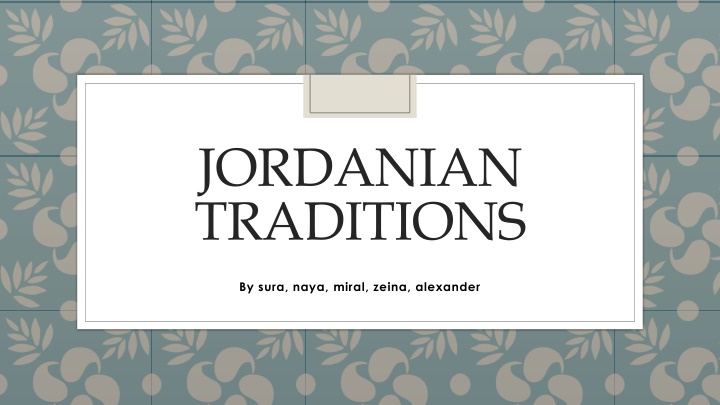
Discover Jordanian Traditions: Dabke Dance and Mansaf Cuisine
Explore the rich culture of Jordan through its traditional practices like the lively dabke dance and flavorful mansaf dish. Dabke, a folk dance with deep roots in the Levantine region, embodies art and heritage. Learn about the evolution of mansaf from its Bedouin origins to its significance in various celebrations like weddings and Eid. Dive into Jordanian traditions with these captivating insights.
Download Presentation

Please find below an Image/Link to download the presentation.
The content on the website is provided AS IS for your information and personal use only. It may not be sold, licensed, or shared on other websites without obtaining consent from the author. If you encounter any issues during the download, it is possible that the publisher has removed the file from their server.
You are allowed to download the files provided on this website for personal or commercial use, subject to the condition that they are used lawfully. All files are the property of their respective owners.
The content on the website is provided AS IS for your information and personal use only. It may not be sold, licensed, or shared on other websites without obtaining consent from the author.
E N D
Presentation Transcript
JORDANIAN TRADITIONS By sura, naya, miral, zeina, alexander
What is dabke? Dabke is an Arabic folk dance originated in the mountains of the levantine region. Dabke also represents art and culture.
How do they make mansaf? The original pastoralist Bedouin mansaf underwent significant changes in the 20th century. The dish is said to originally have been made with simply meat (camel or lamb),meat broth or ghee (clarified butter)and bread. On what occasions do they eat mansaf? People eat mansaf during wedding, graduations, funerals, eid al fitr and eid al adha.
Sources What is Dabke. Source: Sellmans blog 13. How do they make mansaf/on what occasions: Mansaf Wikipedia.
